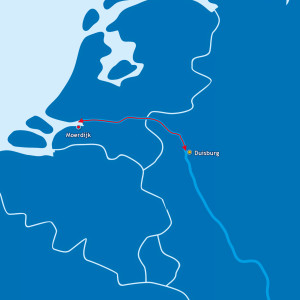WEC Lines and partners launch new barge service to shift freight from road to water

In a collaborative effort to promote sustainable transport and alleviate road congestion, WEC Lines has joined forces with A2B-online, Tailwind Shipping Lines, and Danser Group to launch a new barge service connecting Moerdijk in the Netherlands and Duisburg in Germany. This initiative aims to provide a competitive, eco-friendly alternative to road transport for cargo moving between the Ruhr area and Southern Europe. The new service, operated by Danser Group's MS Tranquilo, will initially offer two sailings per week between Moerdijk's Combined Cargo Terminals (CCT) and Duisburg's Duisburg Gateway Terminal (DGT).
This connection seamlessly integrates with existing shortsea services from Moerdijk, expanding intermodal options for shippers. "With this new barge service, we offer a competitive alternative to road transport for our clients in the Ruhr area into Southern Europe and vice versa," stated Brian Vaz, Intermodal Analyst & Projects at WEC Lines. "This supports our commitment to respond to market demand while ensuring timely, secure, and eco-friendly delivery."
 Photo (C) WEC Lines
Photo (C) WEC Lines
Departures from Moerdijk to Duisburg will take place every Monday afternoon and Wednesday evening, with return journeys scheduled for Tuesday and Friday evenings. The initial focus is on establishing a reliable, scheduled service, with plans to increase frequency in the future.
The Duisburg Gateway Terminal, the world's largest inland port, is set to become the first fully greenhouse gas neutral terminal, aligning perfectly with WEC Lines' target of achieving net-zero emissions by 2050. This new barge service also strengthens the Port of Moerdijk's role as a key intermodal hub, connecting the Ruhr area via inland waterways. It integrates smoothly with WEC Lines' NWC CAI service to Iberia, offering broader connectivity for cargo flows.
Furthermore, the barge connection contributes to reducing road traffic and improving sustainability on the Moerdijk-Ruhr corridor. CCT played a crucial role in facilitating this partnership.
Sign up to the Project Cargo Journal Newsletter
You just read one of our premium articles free of charge
Want full access? Take advantage of our exclusive offer
References
- ^ See the offer (www.projectcargojournal.com)